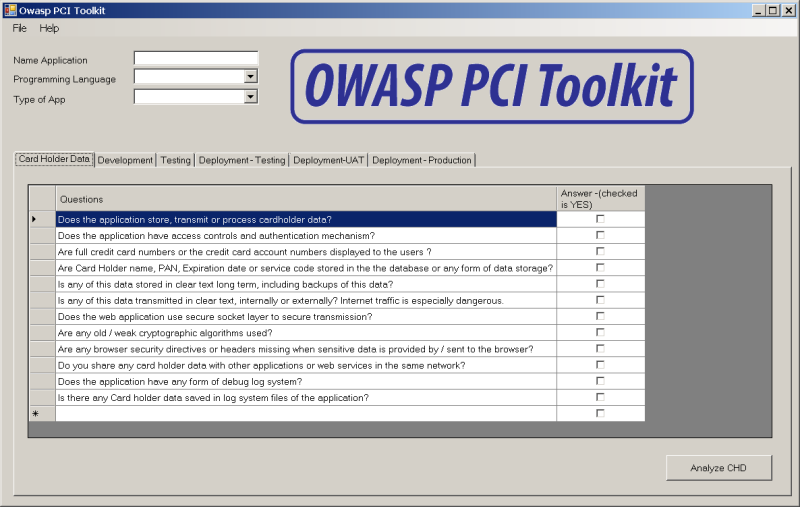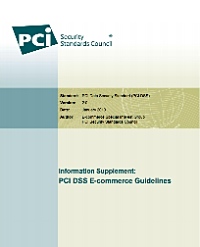This site is the archived OWASP Foundation Wiki and is no longer accepting Account Requests.
To view the new OWASP Foundation website, please visit https://owasp.org
Difference between revisions of "Key Project Information:OWASP PCI Project"
| Line 36: | Line 36: | ||
https://github.com/owaspjocur/OwaspPciToolkit | https://github.com/owaspjocur/OwaspPciToolkit | ||
| + | |||
| + | Download Program: | ||
| + | [[File:Release.zip]] | ||
| + | HASH: | ||
| + | MD5 : 423a76898151feceffadc874638ba8b6 | ||
| + | SHA1 : 16ea72b19842e8cbb33776d78e5003c109074f3d | ||
== Reference Files == | == Reference Files == | ||
| Line 74: | Line 80: | ||
= How to = | = How to = | ||
| + | <b>Step 1</b> | ||
| + | |||
| + | Download the Release.Zip file and control the Hash verification number | ||
| + | |||
| + | Unzip folder and simply double click on OwaspPciToolkit.exe | ||
| + | |||
| + | <b>Step 2</b> | ||
| + | |||
| + | Fill in the Name of the application, Programming language and Type of App | ||
| + | |||
| + | <b>Card Holder Data</b> | ||
| + | |||
| + | On the First tab Card Holder Data, please click the answers that you consider as verifiable for the web application | ||
| + | Once you are done answering click "Analyze CHD" | ||
| + | |||
| + | The report produced can be found on the same folder (unzip Release) and open the file: PCI-DSS_analysis.txt | ||
| + | |||
| + | <b>Important Notice</b> | ||
Understanding of security vulnerabilities and the OWASP top ten is essential for using properly this scoping tool. | Understanding of security vulnerabilities and the OWASP top ten is essential for using properly this scoping tool. | ||
Revision as of 14:37, 27 May 2014
OWASP PCI ToolkitOWASP PCI toolkit is an Open Source c# Windows form project, that will help you to scope the PCI-DSS requirements for your System Components. Beta version of this tool will be released May 2014 IntroductionThe PCI toolkit is based on a decision tree assessment methodology, which helps you identify if your web applications are part of the PCI-DSS scope and how to apply the PCI-DSS requirements. By decomposing , one by one , you will be able to create an assessment and a final report of your scope delimitation and which OWASP guidelines must be used LicensingOWASP PCI Toolkit is free to use. It is licensed under the Creative Commons Attribution-ShareAlike 3.0 license, so you can copy, distribute and transmit the work, and you can adapt it, and use it commercially, but all provided that you attribute the work and if you alter, transform, or build upon this work, you may distribute the resulting work only under the same or similar license to this one. Preview toolPresentationhttps://www.owasp.org/index.php/File:Pci-dss.pdf Project Leader(s)Johanna Curiel Related Projects
Repositoryhttps://github.com/owaspjocur/OwaspPciToolkit Download Program: File:Release.zip HASH: MD5 : 423a76898151feceffadc874638ba8b6 SHA1 : 16ea72b19842e8cbb33776d78e5003c109074f3d Reference Files
The OWASP SCP does not include identity values for the requirements, so please use this list.
News and EventsA presentation of the tool will be given at APPSEC EU 2014 For more info visit: https://www.owasp.org/index.php/OWASP_Project_Summit_2014/Home#tab=Tracks_and_Sessions
PCIDSSOWASP Cornucopia Ecommerce Website Edition is referenced in the new Payment Card Industry Security Standards Council information supplement PCI DSS E-commerce Guidelines v2, January 2013 Classifications
| |||||
Step 1
Download the Release.Zip file and control the Hash verification number
Unzip folder and simply double click on OwaspPciToolkit.exe
Step 2
Fill in the Name of the application, Programming language and Type of App
Card Holder Data
On the First tab Card Holder Data, please click the answers that you consider as verifiable for the web application Once you are done answering click "Analyze CHD"
The report produced can be found on the same folder (unzip Release) and open the file: PCI-DSS_analysis.txt
Important Notice
Understanding of security vulnerabilities and the OWASP top ten is essential for using properly this scoping tool. The tool helps you identify if the application falls within the PCI-DSS scope in order to become compliant however it is essential to identify if your organization has the necessary tools and know-how to be able to create a scope
- Knowledge of the OWASP top ten
- Knowledge of penetration tests and tools as advised by the PCI security council (ASV vendors)
What is PCI-DSS?
The PCI Security Standards Council offers robust and comprehensive standards and supporting materials to enhance payment card data security. These materials include a framework of specifications, tools, measurements and support resources to help organizations ensure the safe handling of cardholder information at every step. The keystone is the PCI Data Security Standard (PCI DSS), which provides an actionable framework for developing a robust payment card data security process -- including prevention, detection and appropriate reaction to security incidents.
How does the PCI toolkit work?
The toolkit helps you identify if the application falls into the PCI-DSS scope and the necessary measures that must be taken in order to become compliant The tool by it self does not scan your application but it guides you on the available tools, guidelines and documents related to understand much better how to properly execute the scope and test the application against security vulnerabilities
What is the purpose of this tool?
The main purposes is to offer an interactive guideline on how to determine if a web application falls into the PCI-DSS scope. The PCI-DSS requirements do not specify which guidelines , tools or how to implement the requirements, this tool helps you understand how to do it.
Volunteers
Johanna Curiel
Ignacio Salom
A prototype of the tool will be released in May 2014 -Beta version 1.0 This beta version provides the following features Series of Questions and answers regarding the Web application to be analyzed For each application present in the environment to be analyzed,
- Analysis and report of Card Holder Data present
- Analysis Report of Development Environment process and procedures
- Analysis Report of Testing Environment process and procedures




